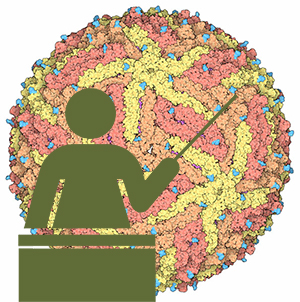The course aims to the understanding of function of viral genetic material and the
ways in which viruses and viral proteins interact with host cells in order to
integrate, express their genetic material and reproduce them.
The course focuses on the study of viral genome and viral proteome, explains the
mechanisms and rates of viral mutations and viral drug resistance, and analyses
viral evolution but also the virocentric evolution of species.
By attending the course, the student will become familiar with basic concepts on
viral infections and epidemiological patterns, a system’s antiviral response, and
the differences between the clinical outcomes and the research methods used for
antiviral drug design and antiviral therapies in terms of their genetic material.
Finally, the student learns about the current developments on gene therapy with
viral delivery systems and understands the obstacles and ethical issues that need to be addresses concerning gene editing.
Upon successful completion of the course, the student will be able to understand
the function and structure of the genetic material of the viruses and monitor the
continuous developments of this scientific field that aims to find answers about
the function and the reason / purpose of viruses.
Upon successful completion of the laboratory exercises, the student will be able
to use online platforms (Vipr) for the application of the following analysis
methods: multiple alignment of viral genomes, phylogenetic analysis of viral
genomes, analysis of SNPs in viral sequences, metanalysis of viral genomes and
sequence feature variants in viral proteins

